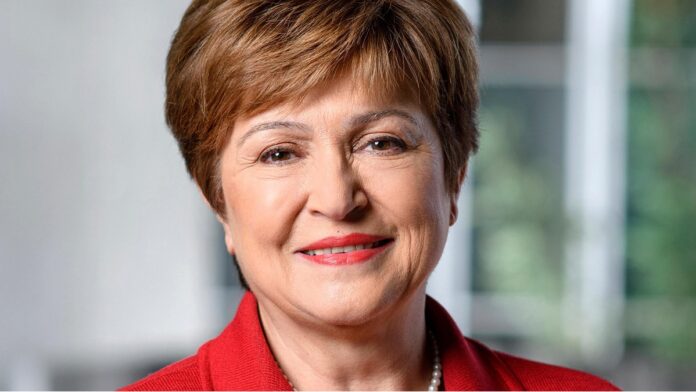Act Now, Act Together: Kristalina Georgieva, IMF Managing Director
As we gather, we face a difficult global environment. The world economy has been hit by one shock after another—Covid, Russia’s invasion of Ukraine, and climate disasters on every continent. They continue to harm people’s lives, and they have caused a cost-of-living crisis.
The immediate toll is clear. On Tuesday, we cut our global growth forecast to 2.7 percent in 2023. Across many economies, the risks of recession are rising. And even when growth is positive, for many people, it will feel like a recession because of rising prices and shrinking real incomes.
On top of this, risks to financial stability are growing and uncertainty remains exceptionally high. Our World Economic Outlook shows a one-in-four chance that global growth could drop to a historic low of 2 percent next year.
These repeated shocks and growth setbacks raise a bigger question: are we experiencing a fundamental economic shift in the world economy —from a world of relative predictability and stability, to greater uncertainty and volatility?
What does this mean for policymakers? It is a much more complex time, which requires steady hands at the policy levers. The price of policy missteps, the price of poor communication of policy intentions, is very high. This week, we have an opportunity to work toward minimizing the risk of missteps.
And that brings me to our Global Policy Agenda. Let me give you a few highlights. We are appealing to policymakers to act with a sense of urgency now, and to act together. We see very clear areas where we can do better, even in this more complex environment:
First, bring inflation down. We know that rising interest rates come at a cost to growth. But we also know that not tightening enough to put a leash on inflation would mean interest rates staying higher for longer, resulting in even more harm to growth and people. For central banks, this means taking decisive action when necessary, and communicating as clearly as they can.
Second, act now to put in place responsible fiscal policy. We must prioritize protecting vulnerable households and businesses. But we have to do that at a time when fiscal buffers are exhausted because of the pandemic and levels of debt are very high.
The obvious conclusion is that policy measures need to be temporary and well-targeted. Steer away from across-the-board fiscal support that is neither effective nor affordable.
If we are to help people and fight inflation, we must ensure that fiscal and monetary policies go hand in hand. When monetary policy hits the brakes, fiscal policy should not step on the accelerator—that would make for a very dangerous ride.
Third, act now to safeguard financial stability, particularly as we see rising financial sector risks. Macro prudential policies need to be even more vigilant and proactively address pockets of vulnerability.
In this environment, we also must support vulnerable emerging markets and developing countries. It is tough for everybody, but it is even tougher for countries that are now being hit by a stronger dollar, high borrowing costs, and capital outflows—a triple blow that is particularly heavy for countries that are under a high level of debt. We are focusing on debt this week, especially for low-income countries where over 60% are at or near debt distress.
We need stronger efforts to confront food insecurity —345 million people are acutely food insecure. Children, women, and men are at risk of dying because of hunger.
And we need transformational reforms to address climate change, to make digitalization work for people, and to address inequality. To confront these issues, we must act with sense of urgency now, and we must act together.
The IMF is working with our 190 members on these issues. Our economic analysis is front and center to help countries navigate this complex environment and avoid policy mistakes.
Our lending is aligned with our counter-cyclical role. Since the pandemic began, we have provided $260 billion in financial support to 93 countries. Since Russia’s invasion of Ukraine, we have supported 18 new and augmented programs with close to $90 billion. And we now have 28 additional countries expressing interest in receiving support from the Fund.
That comes on top of the $650 billion SDR allocation. We have an ambition of $100 billion of on-lending of SDRs from countries in a strong position. Where are we? We have just crossed over $80 billion. And we are determined to reach the target in the coming months.
We have created our first ever long-term financing instrument to support the transformation of economies—the Resilience and Sustainability Trust. It is now operational. We have pledges of $40 billion, and staff level agreements for the first three countries: Barbados, Costa Rica, and Rwanda. READ:IMF Says Russia-Ukraine Crisis to Impact Africa Economy
For countries suffering from the food crisis, we have expeditiously opened emergency financing—the Food Shock Window—to provide rapid financing for urgent needs.
Let me finish on debt. We are pressing for a more effective debt resolution mechanism. We want the G20 Common Framework to become more predictable, with clear guidelines and equality of treatment for all creditors, public and private. We are also looking for ways to expand that kind of donor coordination to middle-income countries, such as Sri Lanka.
There is a lot to do this week. We must act urgently, and act together to make a difference in the lives of hundreds of millions of people. Thank you.












